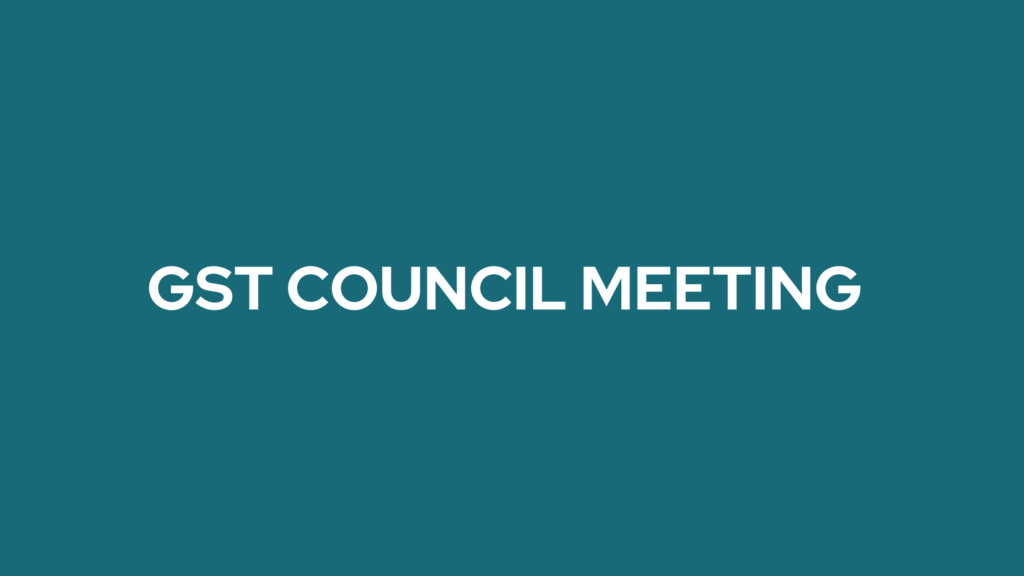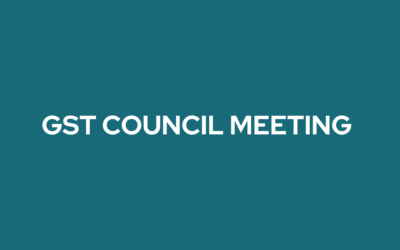47th GST Council Meeting – Highlights & Updates
Here the Complete Information of 47th GST Council Meeting and Details
The Union Finance Minister Nirmala Sitharaman addressed the media at the conclusion of the 47th GST Council meeting, which took place in Chandigarh on Wednesday afternoon. In this article, we will focus on the key highlights of the 47th GST Council Meeting, recommendation on GST rate on different goods and services.
The meeting was presided over by Smt. Nirmala Sitharaman in the presence of state ministers and the Minister of State for Finance, Shri Pankaj Chaudhary. After several months, a big meeting was conducted that covered a number of important topics, including changes to Form GSTR-3B, changes to rates and the elimination of exemptions, inversion adjustments, and IT-related measures.
Key Highlights in the 47th GST Council Meeting
-
Relief for E commerce Suppliers
- The GST Council decided to remove compliance obstacles for online retailers.
- It made registration easier for e-commerce suppliers and helped them pay less in taxes by allowing them to register under the composition system for intrastate supplies.
- Once the IT system is in place, the new composition scheme for e-commerce suppliers for intrastate online sales will be put into effect on January 1st, 2023.
- It means that these intrastate e-commerce vendors will no longer be required to register for mandatory GST if their annual revenue does not surpass the lower limitations established for particular states/UTs, which are Rs. 40 lakh for commodities and Rs. 20 lakh for services.
- Regardless of turnover, interstate providers using e-commerce platforms are obligated to register.
-
GST Council approved GSTR-3B modifications
- The GST Council approved GSTR-3B modifications (Monthly GST return for taxpayers).
- For improved compliance and ease of compliance, it allowed auto-population of the majority of details in Form GSTR-3B and annual returns in Form GSTR-9.
- The new GST return system would be discontinued since it is no longer necessary, the Council stated clearly.
- A proposal for extensive changes to GSTR-3B will be made available to the public for comment.
-
Relaxation in GSTR 9
- It will still be applicable with a few adjustments and easings.
- For the remainder of FY 2021–2022, those having threshold turnovers below Rs. 2 crore are still exempt from filing GSTR-9 and GSTR-9A.
- The deadline for issuing decisions relating to claims tied to the annual return due date under Section 73 of the CGST Act for FY 2017–18 has been extended until September 30, 2023.
-
Due date extension for GSTR 4
-
- Instead of the former extension of up to 30 June 2022, GSTR-4 for FY 2021–22 will now receive a waiver of the late charge for submitting until July 28, 2022.
- The CMP-08 deadline for April–June 2022 (Q1 of FY 2022-23) has been extended from July 18–July 30, 2022.
Recommendation on GST rate for different Goods and Service Tax
|
Particulars |
New GST Rate in % |
|
contracts and subcontracts for earthwork projects with the federal, state, union territories, and local governments. |
12 |
|
Leather that has been prepared, polished, or made of composition. |
12 |
|
systems and heaters for solar water. |
12 |
|
Jobs in the processing of hides, skins, and leather, the manufacture of leather goods such footwear, and the production of clay bricks. |
12 |
|
Air-based atta chakki, a wet grinder, washing, sorting, or grading equipment for seeds and grain pulses, as well as milling or cereal-making equipment, are all examples of Pawan Chakki; |
18 |
|
machines for milking cows and other dairy products, as well as equipment for cleaning, grading, or sorting eggs, fruit, or other agricultural products. |
18 |
|
Water handling equipment includes centrifugal pumps, submersible pumps, deep tube-well turbine pumps, and power-driven bicycle pumps. |
18 |
|
Paper knives, cutting blades, pencil sharpeners and their blades, cake servers, spoons, forks, and ladles, among other items. |
18 |
|
For use in writing, printing, and drawing ink. |
18 |
|
Work contracts and subcontracts for canals, dams, pipelines, water supply plants, historical sites, educational institutions, hospitals, and other projects are made with the federal, state, and local governments as well as with local authorities. |
18 |
|
Foreman services provided to chit fund |
18 |
|
Tools for drawing and marking |
18 |
|
Contract for construction of roads, bridges, a crematorium, an effluent treatment facility, etc. |
18 |
|
LED lamps, lighting fixtures, and their metal printed circuit boards |
18 |
|
Refund of accumulated ITC (Input Tax Credit) for coal and food oils is not permitted. |
|
Other important discussion on 47th GST (Goods and Service Tax) Council Meeting
- More information will be provided regarding the use of funds in electronic credit ledgers and electronic cash ledgers to pay output tax obligations due in returns. These funds cannot be used to settle fines, late fees, or interest.
- After a thorough analysis of its structure, the GST Council will convene a Group of Ministers (GoM) to discuss the possibility of establishing GST Appellate Tribunals.
- Reviewing the National Anti-Profiteering Authority in depth (NAA).
-
- The Solicitor General will represent the NAA in instances if its constitutionality is called into question.
- In SC cases where NAA has been remanded by state HC against the orders, the government may soon appeal.
- In cases where profiteering has taken place, the NAA has established an advocates panel to achieve justice for consumers.
- By tolerating the two-year COVID period from March 1, 2020, to February 28, 2022, the GST Council approves a relief from the requirement to file refund claims. Council resolves to disregard the two-year window and allow tax officials to appeal incorrect reimbursements.
- Refund requests for exports of power and some items with a reduced price are made simpler by using an inverted tax structure.
- In order to identify non-compliant taxpayers early on and take appropriate action to reduce revenue losses, GST Network may set up AI/ML-based systems to cross-check the antecedents of GST registration applicants and improve risk-based monitoring of their behavior after registration.
- After careful consideration, it was decided to postpone the implementation of the GST margin system for tour operators.

